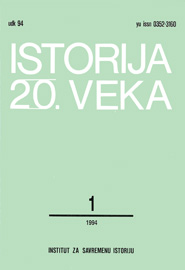NORMALIZACIJA JUGOSLOVENSKO-SOVJETSKIH DIPLOMATSKIH ODNOSA 1953. GODINE
THE NORMALIZATION OF DIPLOMATIC RELATIONS BETWEEN YUGOSLAVIA AND THE USSR IN 1953
Author(s): Đoko TripkovićSubject(s): Diplomatic history, Political history, Recent History (1900 till today), Post-War period (1950 - 1989)
Published by: Institut za savremenu istoriju, Beograd
Keywords: Yugoslavia; USSR; diplomacy; normalization; postwar period; Stalin's death;Tito; 1953;
Summary/Abstract: The severe conflict between Tito and Stalin and the parties and countries they presided over put a serious strain on diplomatic relations between Yugoslavia and the USSR from its outbreak in 1948 until Stalin's death in 1953. The relations between the two countries were coldly reserved and strictly formal, with frequent outbursts of open animosity. The Yugoslav diplomatic staff, reduced in number, found itself in a hostile atmosphere and exposed to various forms of pressure and maltreatment. In time, the staff managed to come out of its unpleasant isolation and establish good relations with diplomatic representatives of countries not belonging to the Soviet bloc. The situation remained unchanged until Stalin’s death in 1953 despite the growing conviction on both sides, towards the end of this period, that political interests called for a normalization of relations. It was finally decided in the Kremlin that any attempt to overthrow Tito, both from abroad or from within the country, would be futile since his position was stronger than before, while Yugoslavia’s increasing closeness with the West and especially its possible admission to the NATO through the mediation of the Balkan Alliance, was becoming a matter of concern and a threat to vital Soviet interests. A hasty change of Soviet policy towards Tito was required to prevent this. Yugoslav political leaders were also interested in adjusting relations with the USSR. This desire was motivated on the one hand by the need to remove the pressure exerted by the Soviet bloc, especially the threat of military intervention and on the other by the tacit fear present among the leading men of Tito’s communist regime that the country’s continued orientation towards the West could cause its immersion into western-type economic, financial and military frames, which in turn would inevitably affect the regime in Yugoslavia, inducing its transformation from a one party to a multiparty system. Renewed relations with the communist world would considerably lessen the chances of such an outcome. Stalin’s death in March 1953 opened the way towards the normalization of diplomatic and, subsequently, of all other relations between Yugoslavia and the USSR.
Journal: Istorija 20. veka
- Issue Year: 1994
- Issue No: 1
- Page Range: 111-122
- Page Count: 12
- Language: Serbian

